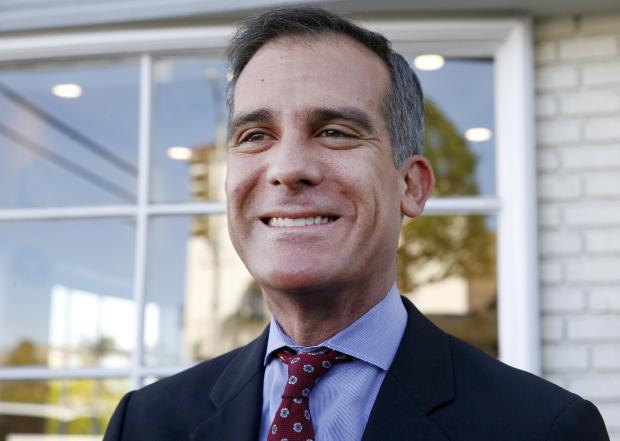
In this photo, taken March 8, 2017, Los Angeles Mayor Eric Garcetti speaks to media after his election victory in Los Angeles. More than 250 mayors are meeting at the US Conference of Mayors in Miami Beach, some warning President Donald Trump that toughening immigration enforcement meddles with US cities’ affairs. “Some of us are proud to be places of sanctuary, to protect immigrants, but this idea that we’re in violation of something, I think is a big charade,” said Garcetti. (Photo by NICK UT / AP)
MIAMI BEACH, Florida — Mayors are warning President Donald Trump that toughening immigration enforcement meddles with US cities’ affairs.
More than 250 mayors are meeting at the US Conference of Mayors in Miami Beach to take a stance on issues from climate change to the federal budget and health care. They are reviewing resolutions that would strongly oppose Trump’s crack down on illegal immigration.
Mayors were struck a blow in January, when Trump ordered to cut funding to jurisdictions that deny in some way cooperation with federal immigration agents. Most cities have defied the order, and a federal judge blocked it in April, at least temporarily.
“Some of us are proud to be places of sanctuary, to protect immigrants, but this idea that we’re in violation of something, I think is a big charade,” said Los Angeles Mayor Eric Garcetti.
Garcetti argued that all he wants from immigration officials is that they conduct enforcement in a “lawful, constitutional, court-ordered way,” referring to policies where sanctuary cities demand warrants to turn over suspects to the US Immigration and Customs Enforcement.
“Police officers in Los Angeles do 20,000 to 30,000 requests for warrants from judges every year in the middle of the night when the judges are probably in their pajamas,” Garcetti said. “The idea that ICE can’t do the same thing seems ridiculous.”
Mayors from big cities say they fear the increased enforcement will push immigrant communities into the shadows, deterring them to report crimes or cooperate as witnesses. The police chief of Los Angeles, Charlie Beck, said in March that sexual assaults and domestic violence reports by Latinos had dropped.
Miami-Dade County, which houses 34 municipalities including the conference host of Miami Beach, heeded Trump’s January order and changed its policy so the corrections department honors all requests by ICE. Authorities have turned over 124 people to the US Immigration and Customs Enforcement since Jan. 27.
But GOP-identified mayors from states such as Indiana and Florida disagreed this weekend on targeting non-criminal immigrants solely for being in the country illegally.
Kent Guinn, mayor of Ocala, Florida, says that although he is against offering a pathway to citizenship to the 11.5 million immigrants who are in the country illegally, most immigrants he sees are “good.”
“I don’t think people realize there are some bad people that are here that need to leave,” Guinn said.
He referred to the 2015 shooting death of a San Francisco woman often highlighted by Trump when attacking sanctuary policies because the man charged with her death was in the country illegally and had been released by local law enforcement.
“But the ones that we encounter on a day-to-day basis, they’re very hard-working individuals that do the things that they need to do and participate in the economy,” Guinn said. “They work on horse farms, in restaurants. We see them. They’re good people. We’re not going around looking for them.”
The Republican Mayor of Carmel, Indiana, Jim Brainard, who is also bucking his party on the climate front, says he opposes Trump’s immigration views.
“Punishing cities makes no sense,” Brainard said. “Everyone who has come to this country, regardless of whether it was illegal, ought to have a pathway to legalization and then we can move to issues that really can help make our country better.”
Besides opposing the order on sanctuary cities, several mayors propose extending a deportation reprieve granted by former President Barack Obama to young immigrants who arrived illegally. Trump had vowed to end the program known as Deferred Action for Childhood Arrivals, calling it “illegal executive amnesty” but has not yet decided whether he will revoke it.
ICE said it arrested more than 41,000 people on immigration charges in Trump’s first 100 days in office, an increase of nearly 40 percent from the same period a year earlier. Nearly 11,000 had no criminal convictions, more than double the number of immigrants without criminal convictions that were arrested during a comparable period last year.